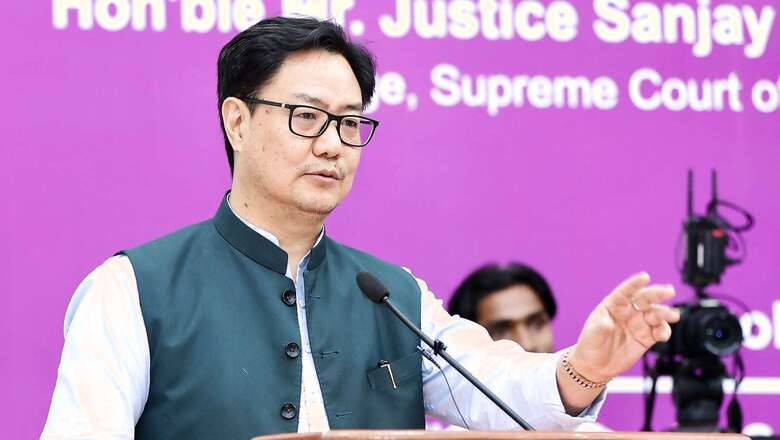'SC Hijacked Constitution': Rijiju Cites Judge With 'Sane Views' on Collegium System for Appointment

views
Union Minister for Law and Justice Kiren Rijiju on Sunday cited the views of a retired high court judge, who said the Supreme Court “hijacked” the Constitution by deciding to appoint judges itself amid ongoing debate over the collegium system of appointing judges.
Sharing the video of an interview of Justice R S Sodhi (retd), a former judge of the Delhi Court, on Twitter, he wrote: “elected representatives represent the interests of the People & make laws. Our Judiciary is independent and our Constitution is Supreme.”
Actually majority of the people have similar sane views. It's only those people who disregard the provisions of the Constitution and mandate of the people think that they are above the Constitution of India.— Kiren Rijiju (@KirenRijiju) January 22, 2023
Justice Sodhi, in the interview to LawStreet Bharat, said the right to frame laws lies with Parliament. He also said the apex court cannot frame laws as it does not have the right to do so. “The right to frame laws belongs to Parliament,” he said. “… Whether you can amend the Constitution? Only Parliament will amend Constitution. But here I feel the Supreme Court for the first time ‘hijacked’ the Constitution. After ‘hijacking’ they (SC) said that we will appoint (judges) ourselves and the government will have no role in it,” Justice Sodhi said in Hindi.
Referring to Justice Sodhi’s remarks, the law minister in a tweet wrote a “majority” of people have “similar sane views”. “It’s only those people who disregard the provisions of the Constitution and mandate of the people think that they are above the Constitution of India,” he wrote.
The remark is the latest in the flashpoint between the executive and judiciary over the issue concerning the appointment of judges in the higher judiciary.
The Union law minister had written to Chief Justice of India D Y Chandrachud suggesting the inclusion of representatives of the Union and state governments in the Supreme Court and high court collegiums respectively to infuse transparency and public accountability in the selection of judges.
While Rijiju has described the collegium system to appoint judges as something “alien” to the Indian Constitution, Vice President Jagdeep Dhankhar has questioned the top court for striking down the National Judicial Appointments Commission Act (NJAC) and a related constitution amendment.
By bringing the NJAC law, the government had sought to overturn the collegium system which came into being in 1992. The apex court had struck down the NJAC Act and the Constitution (99th Amendment) Act, 2014, in its 2015 verdict, leading to the revival of the Collegium system of existing judges appointing judges to constitutional courts.
The Supreme Court bench had said views of the Centre and states should be taken into account and asked the government to prepare a MOP in consultation with the Chief Justice of India to enable transparency in the collegium system of appointment of judges.
However, a parliamentary panel had expressed surprise that the government and the Supreme Court Collegium have failed to arrive at a consensus on the memorandum of procedure (MoP), guiding the appointment, elevation and transfer of apex court and high court judges, even after almost seven years.
Last week, the Supreme Court collegium had for the second time reiterated the names of two advocates for appointment as judges of the Calcutta High Court “expeditiously”, saying it was not open for the government to repeatedly send back the same proposal.
(With inputs from PTI)
Read all the Latest India News here


















Comments
0 comment